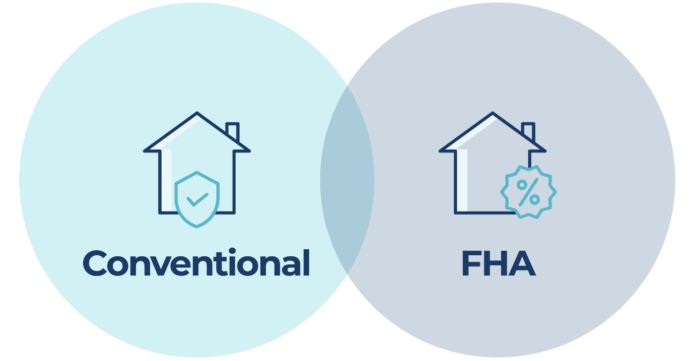When you decide to buy a home, you might find yourself exploring various financing options to make your dream come true. Two popular choices that homebuyers often consider are FHA (Federal Housing Administration) loans and conventional loans. Each of these loan types has its own set of features and requirements that cater to different individuals and their specific financial situations. In this article, we will delve into the key differences between FHA vs conventional loan to help you make an informed decision.
What is an FHA Loan?
An FHA loan is a mortgage loan insured by the Federal Housing Administration, which is a part of the U.S. Department of Housing and Urban Development (HUD). These loans are designed to make homeownership more accessible, particularly for first-time homebuyers and those with lower credit scores.
Advantages of FHA Loans:
- Lower Credit Score Requirements: One of the significant advantages of an FHA loan is that it typically accepts borrowers with lower credit scores, making it more accessible to individuals who may not qualify for conventional loans.
- Low Down Payment: FHA loans offer a lower down payment requirement, allowing borrowers to put down as little as 3.5% of the home’s purchase price.
- Competitive Interest Rates: FHA loans often come with competitive interest rates, making them appealing to homebuyers on a budget.
Disadvantages of FHA Loans:
- Mortgage Insurance Premiums (MIP): FHA loans require upfront and annual mortgage insurance premiums, increasing the overall cost of the loan.
- Loan Limits: FHA loans have limits on the maximum loan amount, which may restrict buyers looking for more expensive properties.
What is a Conventional Loan?
A conventional loan, on the other hand, is not insured or guaranteed by any government agency. These loans follow guidelines set by mortgage giants such as Fannie Mae and Freddie Mac, and they are ideal for borrowers with good credit and a stable financial history.
Advantages of Conventional Loans:
- Flexibility: Conventional loans offer more flexibility in terms of property type and loan amount, making them suitable for various homebuyers.
- No Mortgage Insurance with 20% Down: If borrowers can make a down payment of at least 20% of the home’s purchase price, they can avoid paying private mortgage insurance (PMI).
- Higher Loan Limits: Conventional loans generally have higher loan limits, allowing borrowers to finance more expensive properties.
Disadvantages of Conventional Loans:
- Stricter Credit Score Requirements: Conventional loans usually require higher credit scores compared to FHA loans, which can make it challenging for some individuals to qualify.
- Higher Down Payment: Conventional loans typically have a higher down payment requirement, making it difficult for buyers with limited funds.
FHA vs Conventional Loan: Key Differences
When choosing between an FHA vs conventional loan, it’s essential to consider the following key differences:
Credit Score Requirements:
- FHA Loan: Accepts borrowers with lower credit scores, often as low as 500, but may require a higher down payment for those with scores below 580.
- Conventional Loan: Typically requires higher credit scores, usually around 620 or higher, to qualify for a loan.
Down Payment Requirements:
- FHA Loan: Allows a minimum down payment of 3.5% of the home’s purchase price.
- Conventional Loan: Generally requires a higher down payment, often ranging from 5% to 20% or more.
Mortgage Insurance:
- FHA Loan: Requires both upfront mortgage insurance premium (UFMIP) and annual mortgage insurance premium (MIP).
- Conventional Loan: Requires private mortgage insurance (PMI) for down payments less than 20%, but no upfront mortgage insurance.
Loan Limits:
- FHA Loan: Has specific loan limits depending on the county and state, potentially limiting financing options for higher-priced properties.
- Conventional Loan: Typically has higher loan limits, making it more suitable for expensive properties.
Property Eligibility:
- FHA Loan: Can only be used for certain types of properties, such as primary residences.
- Conventional Loan: Offers more flexibility for different property types, including primary residences, second homes, and investment properties.
Loan Approval Process:
- FHA Loan: The approval process for an FHA loan is usually more lenient and straightforward.
- Conventional Loan: The approval process may be more stringent, requiring extensive documentation and verification.
Which Loan is Right for You?
Choosing between an FHA loan and a conventional loan depends on your specific financial situation and homeownership goals.
First-Time Homebuyers:
If you are a first-time homebuyer with a limited down payment and lower credit score, an FHA loan may be a suitable option to help you enter the housing market.
Borrowers with Low Credit Scores:
For individuals with lower credit scores who may struggle to qualify for a conventional loan, an FHA loan could provide a viable solution.
Borrowers with Limited Down Payment:
If you have limited funds for a down payment, an FHA loan’s lower down payment requirement might be more feasible.
Borrowers with High Credit Scores:
Borrowers with high credit scores and substantial down payment may find conventional loans more attractive, as they can avoid mortgage insurance and potentially access better interest rates. Read more…
Conclusion:
In conclusion, both FHA vs conventional loan have their unique benefits and considerations. FHA loans are ideal for first-time homebuyers and individuals with lower credit scores, offering more accessible financing options. On the other hand, conventional loans are suitable for borrowers with higher credit scores and more substantial down payments, providing greater flexibility in property choices. When deciding between the two, it’s essential to assess your financial situation, long-term goals, and eligibility criteria.
FAQs:
- How much is the upfront mortgage insurance premium for an FHA loan?
- The upfront mortgage insurance premium for an FHA loan is currently 1.75% of the loan amount.
- Is there a maximum income limit to qualify for an FHA loan?
- No, there is no maximum income limit to qualify for an FHA loan, but borrowers must meet the debt-to-income ratio requirements.

